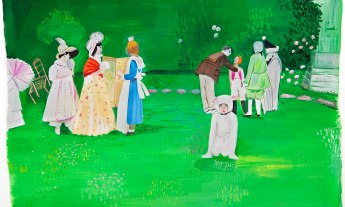
The other day, I got rejected. It wasn’t over love, but nevertheless it stung: a middle school declined my offer to speak to their kids about my latest book, The Gutsy Girl: Escapades for Your Life of Epic Adventure, because it would exclude boys.
At first I shrugged, said I understood and went on to other things. But the more I thought about it, the more wound up I became.
Yes, the book is called The Gutsy Girl: Escapades for Your Life of Epic Adventure. Yes, it opens with an author’s note that starts, “Dear Gutsy Girl.” Yes, all the drawings feature girls.
But that doesn’t mean boys are excluded. It just means that the book isn’t about them.
This, it turns out, is basically the same thing. If you’re talking about boys, I mean.
We are raising our boys to lack empathy.
I thought of all the books I’d read in middle school. Shane, for starters, a Western that centers on fistfighting and shoot-’em-ups. (I loved the book.) The only female character was a mother, who (of course) falls into chaste love with the hyper-masculine duking-and-gunslinging Shane. There was The Red Badge of Courage, which takes place on the Civil War battlefield. Loved it too, but I don’t recall a single female character. These books’ storylines — and many more — were as far away from my life as a girl I could imagine. Yet no one excused me from reading them. And for that I have been very glad.
Then I heard a disturbing story, about a writer who had also written a book that featured girls. When she attended a school assembly to speak to the kids, she saw that many of the seats were empty. Boys, it turned out, had been excused from the program.
So girls are expected to read books about boys, and people of color are expected to read books about whites (and boys). No one thinks twice about whether we should attend the assembly. But boys are immediately excused.
Curious, I looked at that week’s New York Times children’s bestseller list. At first the books seemed to vary wildly. There were robots, cats on surfboards, Norse swords, and pet foxes. But of the top ten, nine featured Caucasian boys. The remaining one starred both a boy (of color) and a girl (white); it was the book adaptation of the movie Star Wars: The Force Awakens. For this week at least, not a single bestseller had a sole female protagonist. Not a one.
Yet the United States is a country where there are more females than males, and which has a public school system in which people of color outnumber white students. What’s up with such a misrepresentative bestseller list? The conclusion I draw is that authors and publishers are throwing their weight behind certain books because of this widespread belief that, hey, everyone will read about boys. So what does this mean for the fate of books? More important: what does this mean for the fate of boys?
We read to experience a panoply of perspectives. We read to learn of people and situations outside and beyond ourselves, so we can deepen our connection and understanding. We read to prepare for life. It follows, then, that we are raising our boys to dismiss other people’s experiences, and to see their needs and concerns as the center of things. We are raising our boys to lack empathy.
This insistence by adults that boys want only boy things ultimately damages girls. But it hurts boys too.
The writer whose presentation was not attended by boys is named Shannon Hale, and in her blog post about the incident she goes even further. She says that the agreement that boys shouldn’t read about girls, that in fact it’s shameful to be interested in what girls do and think about in books, is an agreement that “leads directly to rape culture.”
This is serious stuff.
The Representation Project, a nonprofit that challenges destructive cultural stereotypes, comes to similar sinister conclusions. Its movie, The Mask You Live In, looks at how media, among other forces, convinces boys that anything considered remotely girl-like in oneself is not only to be avoided, it’s to be reviled. The movie asks, how can a boy steeped in contempt for the feminine grow up to respect women? Answer: he can’t and won’t.
I asked Representation Project staffer Cristina Escobar what happens when boys read only books by males, about males. She said that they will be “taught that girls are objects, that they are prizes that they can win,” and that “boys go out and do things and girls sit back and wait to be rescued.”
So this insistence by adults that boys want only boy things ultimately damages girls. But it hurts boys too. Escobar believes that boys do want to read about girls, and the persistent statements otherwise are “a stereotype that adults put on kids.” She points to an extensive study that showed that almost 80% of boys who play video games don’t care about the gender of their avatar. “We all need to explore different parts of our identity and what is unique about us,” she told me. “Unfortunately, media often uses stereotypes to communicate. It puts people in boxes and makes it hard for them to live up to their potential.” She says that this pressure on boys to “stick to a model that doesn’t fit” leads to high rates of binge drinking, depression, school truancy, and even suicide as they become teens.
When a boy is directed to books that reflect only a narrow aspect of the world — often a part he already knows — or he is shamed for any interest in what is considered a “girl book,” his understanding of girls and of himself is devastatingly incomplete. So the school that rejected me is doing boys no favors. Ironically, The Gutsy Girl: Escapades for Your Life of Epic Adventure is a “girl book” that boys might love. There are no girls tied to the tracks. There are no love interests. There is only mishap, mayhem and close calls on high mountains, raging rivers and ocean expeditions. Daring, skilled women like “Queen Bess” Coleman (barnstormer and parachutist), Mae Jemison (astronaut) and Ashima Shiraisi (one of the best climbers in the world, man or woman, hands down) are highlighted. The only person who needs to be rescued is the narrator (me), and I always manage to rescue myself. Yes, The Gutsy Girl was written to inspire values of bravery and resilience in girls. But it is also a manifesto against the lame stereotypes boys and men hold of us. It’s time that boys see that, as Escobar says, “women are as much doers as the men.” It’s time that boys read girl books, for everyone’s sake.











